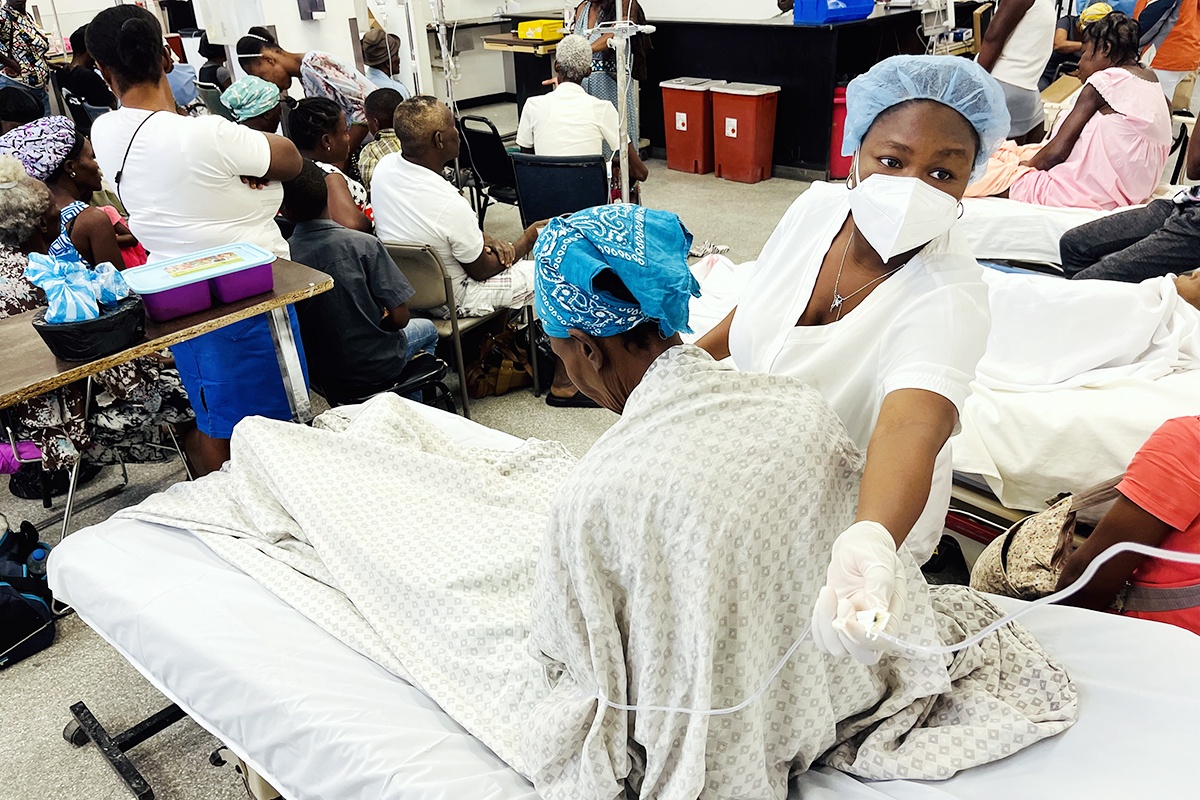Chaos In Haiti Escalates as Gang Violence, Fuel Shortages Threaten Access to Health Care
Hospitals face challenges treating patients; manager deploys a mule to transport fuel
Posted on Mar 24, 2023

"We are practicing war medicine."
That’s an analysis of the current situation in Haiti from Dr. Ralph Blondel Charles, a regional director with Zanmi Lasante (ZL), as Partners In Health is known in Haiti.
According to firsthand accounts and news reports, the gang violence, kidnappings, rape, and general terror that began following the 2021 assassination of Haiti’s President Jovenel Moïse have now increased throughout the country, including the Artibonite region where ZL works. Following a gang-related spree of police killings in January, the dire situation only got worse: officials speculate that up to 90% of Port-au-Prince is controlled by gangs.
Kidnapping has become a daily, almost indiscriminate hazard. Even people who cannot pay ransom are targeted, to say nothing of professionals.
Long-time ZL staff say the current violence and instability in Haiti is some of the worst they’ve seen in four decades. That means sometimes spending the night on the grounds of facilities to stay safe, and falling asleep hearing gunshots around them.
Blondel said clinics have had to adjust hours and schedules, relocate staff, and temporarily suspend some services for safety, including using certain facilities to provide basic emergency triage before referring to another facility farther from the violence.
If things don't change within a couple of weeks, he said, it will be difficult to continue to deliver care and treatment.
"We are functioning with our nails and teeth."
Blocked Transport
Blondel oversees ZL clinical care in the area of Bas Artibonite, where road access is a major problem. There are often roadblocks in all directions, both into and out of clinic sites.
Transporting medical supplies has been the most difficult, he said, with patients suffering long delays for essential medicines and staff awaiting critical items. Sometimes, doctors and medical personnel cannot wait and are forced to purchase supplies locally, but in much smaller amounts. Sometimes goods are snuck in vehicles that do not look like ZL trucks or other forms of transportation.
Located along the western coastline, Saint Marc is the largest ZL medical complex in the Artibonite region and a hub for the other sites. “So, if they can't even make it there, the remaining sites are completely disadvantaged,” he said. “Transports have been nearly impossible for two months now.” Alternate routes, if passable, take far longer than usual, and many routes are impossible due to safety concerns.
All of this while Haiti is also experiencing a widespread cholera outbreak. Blondel said ZL currently has a “dire need” for gloves and other basic supplies that are unable to be delivered. “Now we have a shortage of bandages and gloves at [the hospital in Saint Marc], while we have more than 100,000 pairs stocked and stuck at [Hôpital Universitaire de Mirebalais] waiting to be delivered.”
The heightened danger is weighing on ZL staff, even as they try to persevere.
Their “mental health is highly affected,” he said. “For most of our staff, many who are women, it's very strenuous on them. When they have to go an entire month or more without being able to return home to visit their families, it is hard and it takes a toll.”
Humanitarian Crisis: Help Save Lives in Haiti
Fuel Shortages
Fabrus Guillaume, ZL’s Divisional Director of Site Support Operations, described a fraught and precarious situation as fuel shortages have worsened over the past few months and gangs take control of greater swaths of the country.
Guillaume said all staff living in in smaller communities in the Artibonite region have been relocated for safety, again spending months away from their families in Port-au-Prince.
“It has been very difficult to transport goods and to supply all our Artibonite sites with fuel,” he said. “Sometimes we've had to use roads that are not accessible to vehicles to send fuel to the sites. No company with whom we have a contract wants to deliver fuel to these areas.”
Guillaume said he has been forced to do some creative problem-solving to work around the many barriers in place.
One site recently ran out of fuel, he said. “The motorcycle that we use to carry the fuel in gallons couldn’t climb the high mountains to reach the hospital, so we had to borrow a mule from a peasant to carry the fuel and made it to the hospital.” This is not the first time ZL has relied on a mule for transport.
Several months ago when the country was in lockdown following the fuel crisis, Guillaume said ZL had to purchase fuel at a border town and, again, couldn’t use vehicles or motorcycles to transport due to slippery, unreliable roads. “We had to make several trips using a mule to reach our destination,” he said.
These days, the team cannot reliably provide transportation to all staff, so most employees must use public transportation to get to work, Guillaume said. “It is almost impossible for the technical team to reach certain areas. Last week, the electro-mechanical team had to use public transport to repair a generator at [the hospital in Saint Marc], because the fleet department could not send a vehicle. It took two months for the medicine to reach [several sites], because our truck carrying the drugs could not pass. “
But, he added, the staff is doing what they can to maintain the highest standards for patients.
“We face many risks every day, especially myself who manages the security and fleet team,” Guillaume said. “But as I have always said, we are ZL. We are warriors. And we will not let the poor die because they cannot access medicine or other resources.”

